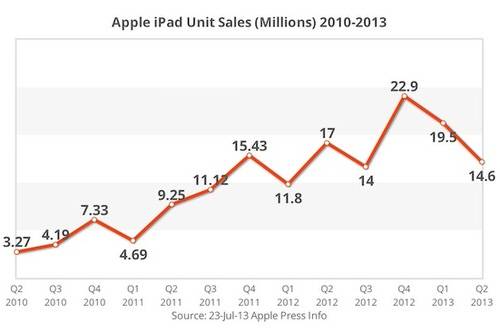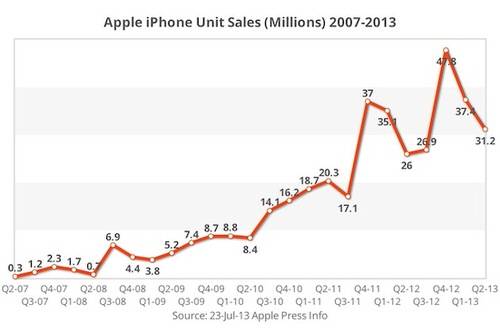Yesterday, news filtered out that Apple’s board of directors is starting to get worried about Apple’s precipitous slide. If Fox Business’ sources can be believed, the board has expressed concern about the company’s “pace of innovation.” You don’t say? As founder of MacWEEK all I can add is, “it’s déjà vu all over again.”
According to Fox Business Network’s Charlie Gasparino, his sources tell him:
From what we understand, there is concern at the board level, sources are telling the Fox Business Network, about the pace of innovation over at Apple. What have they had lately? They had the iPad and a few other things, but they don’t have anything innovating from what came from Steve Jobs and that concern is basically manifesting into pressure on Tim Cook to innovate, and to do something fast.
From a historical perspective, Apple is doing great. After all, who wouldn’t be downright giddy having a product that, in a little over three years, has sold a whopping 155 million units, like the iPad has?
Or who wouldn’t be smug and arrogant after having ushered in a groundbreaking smartphone design, and then selling 388 million of them in just six years?
But as these two charts show, while the overall sales trend is inexorably up for both iPad and iPhone, the sharp plunge both these platforms have experienced in the past two quarters is unprecedented, even accounting for the seasonality.


Meanwhile, as IDC reported this week, in the past quarter, Android’s share of smartphones shipped reached 79.3%, equal to 187.4 million units. Apple’s iOS smartphone platform was a very distant second at 13.2%, or as the above chart shows, 31.2 million units.
Forgive me for digging up the past, but I have seen a similar scenario before. Only the protagonists have changed. Just watch Bill Gates at the Macintosh launch event in 1984:
Notice the smirk at the end. And what about that doublespeak? Was the Macintosh really a new standard or was it just a new standard in capturing people’s imagination? You might have caught a similar smirk on Google Chairman Eric Schmidt’s face as he walked out of an Apple board meeting after Steve Jobs discussed the new iPhone.
Putting Schmidt on the Apple board was clearly a major faux pas. Much like that other mistake in 1997, when CEO Steve Jobs decreed that Apple would kill off PowerComputing, the only successful Mac clone, just as Windows 95, that other Mac clone, started its march towards world domination.
To be sure, I like the fact that I now see Apple-logoed computers just about everywhere I go. I guess the circles I travel in love Apple products. But that wouldn’t have happened if Apple hadn’t unleashed a torrent of 543 million iPhones and iPads on the world. That lead to a lot of converts from Windows. But an iPhone-to-Mac conversion wasn’t a strategy Jobs could possibly have envisioned in 1997.
And as Matt Rossoff pointedly observes, Apple is still the world’s largest computer maker, if you lump tablets with desktop computers. But Rossoff also concedes that No. 2, Lenovo, is gaining ground fast on Apple.
Apple: iZombie
Less than two years after Steve Jobs’ death, it’s starting to look like Apple is in zombie maintenance mode. Take last year’s decision to delay the iPhone’s introduction to September. Combined with the release a new iPad in the same time period, these moves certainly did wonders for Apple’s fourth quarter numbers.
But instead of accelerating the release of new iPhones and iPads, the company has chosen to stubbornly stick with its lethargic strategy of the annual upgrade.
That worked fine when Apple was the only game in town, but after a blizzard of absolutely wonderful Android phones, like the Samsung S4, Sony Xperia Z Ultra, Moto X and LG G2, it’s becoming quite evident that a lot of people are starting to succumb to the siren call of Android.
Even more worrisome is the steady defection of high-profile Apple pundits who have joined the Google camp.
First came the announcement that Guy Kawasaki would be joining Motorola as a Google advisor. Kawasaki was one of the original Apple evangelists, who once told The New York Times in April 1987 he would “always bleed six colors,” referring to Apple’s original logo colors.
Then came news that MG Siegler, TechCrunch’s staunchest defender of everything Apple, was defecting to Google Ventures.
Samson’s Dilemma: Lipstick Or Pig Of A Phone?
When you no longer have the vision of a Steve Jobs lurking around headquarters, you have two options: You can either start listening to your customers and give them what they want, or you can sharply accelerate your R&D and pray you can catch a big new wave soon.
Neither is happening at Apple. Of greatest concern is the massive effort being expended on making iOS 7 look pretty. Converting nearly one million apps to iOS 7’s new design is costing developers untold hours of work and is akin to putting lipstick on a pig.
A much more tactical use of developer time would have been adapting their apps to the new dimensions of a bigger iPhone, one for which the market is positively begging. If Apple actually listened to their customers, they would have already heeded the call to make such a device, because the trend towards “phablets” is simply unstoppable.
To understand why, you just have to go back to April 2010 and you will discover that the seeds for the big-ass phone lay in Apple’s own runaway iPad hit, which made consumers realize that they needed a big-screen device like a tablet but didn’t want to carry both an iPad and an iPhone, if one device could do.
That Apple would be the last company on earth to realize that consumers want convergence between smartphone and tablet is doubly ironic, given that it trailblazed both formats.
But as recent data suggests, the Android camp has not only caught up but is now firmly ahead.
When another former devout Apple disciple of mine, MacWEEK star reporter John Battelle, observed on Bloomberg last September that Apple’s iPhone is a giant fail and that the Cupertino company was losing its way, I was flabbergasted by his observations.
I’m starting to get an ugly feeling inside that I may soon have to agree with Battelle. My heart is bleeding in six colors.
Lead image courtesy felkafish, via Creative Commons License 3.0.









